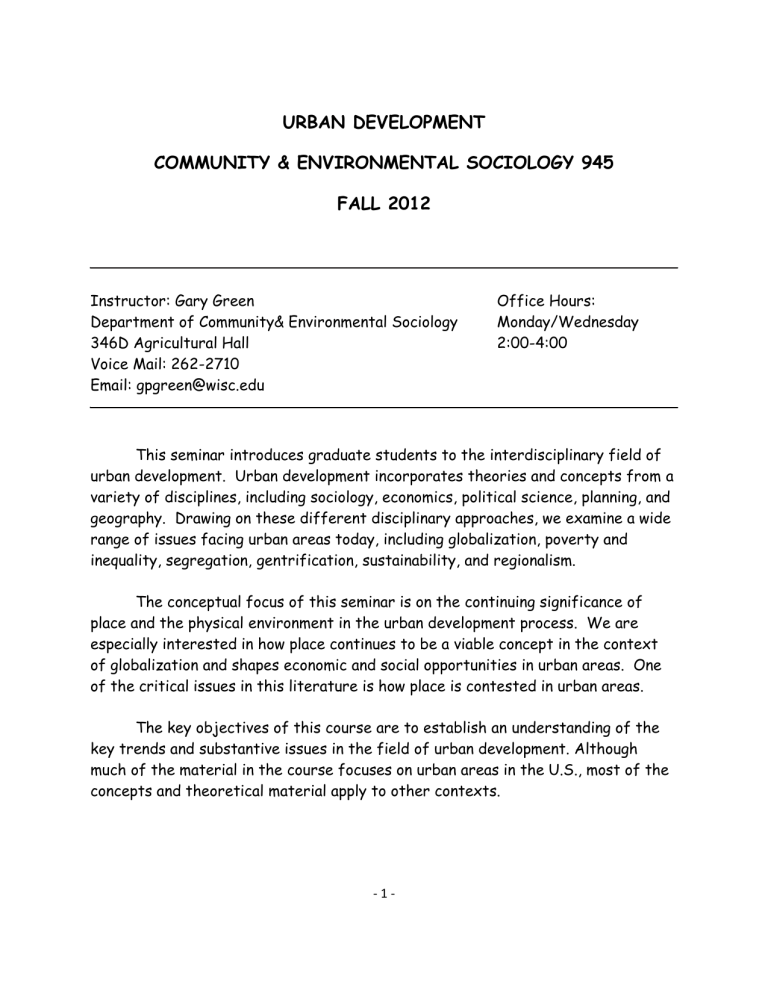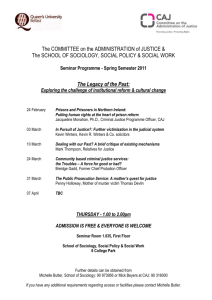Community and Environmental Sociology 945

URBAN DEVELOPMENT
COMMUNITY & ENVIRONMENTAL SOCIOLOGY 945
FALL 2012
Instructor: Gary Green
Department of Community& Environmental Sociology
346D Agricultural Hall
Voice Mail: 262-2710
Email: gpgreen@wisc.edu
Office Hours:
Monday/Wednesday
2:00-4:00
This seminar introduces graduate students to the interdisciplinary field of urban development. Urban development incorporates theories and concepts from a variety of disciplines, including sociology, economics, political science, planning, and geography. Drawing on these different disciplinary approaches, we examine a wide range of issues facing urban areas today, including globalization, poverty and inequality, segregation, gentrification, sustainability, and regionalism.
The conceptual focus of this seminar is on the continuing significance of place and the physical environment in the urban development process. We are especially interested in how place continues to be a viable concept in the context of globalization and shapes economic and social opportunities in urban areas. One of the critical issues in this literature is how place is contested in urban areas.
The key objectives of this course are to establish an understanding of the key trends and substantive issues in the field of urban development. Although much of the material in the course focuses on urban areas in the U.S., most of the concepts and theoretical material apply to other contexts.
- 1 -
REQUIRED READINGS
John Logan and Harvey Molotch. 2007 . Urban Fortunes: The Political Economy of
Place. Berkeley: University of California Press.
Saskia Sassen. 2006. Cities in a World Economy, Third Edition. Thousand Oaks,
CA: Pine Forge Press.
Douglas Massey and Nancy Denton. 1998 . American Apartheid: Segregation and the Making of the Underclass. Harvard University Press.
Richard Florida. 2003. The Rise of the Creative Class. New York: Basic Books.
J. Eric Oliver. 2001. Democracy in Suburbia. Princeton: Princeton University
Press.
Don Mitchell. 2003. The Right to the City. New York: Guilford Press.
William Julius Wilson. 1996. When Work Disappears. New York: Knopf.
Additional readings are available on Learn@UW.
PREPARATION AND PARTICIPATION
This is a seminar, so I do not plan to lecture. In most weeks, I will provide a short discussion of the context or issues that relate to the reading. For each class session, a few students will take responsibility for leading the discussion of selected readings. Students should summarize the major arguments of the readings and provide a critical analysis and evaluation. We will use the discussion questions submitting by seminar participants to organize the remainder of the discussion. It is important that seminar participants come prepared to discuss the material each week. Occasionally, I will assign some additional readings to provide a deeper theoretical context or background for the discussion during that week.
- 2 -
ASSIGNMENTS
#1 - Weekly - For each class session, submit at least two questions that would be suitable for discussion in the seminar. Accompany your questions with brief comments that integrate the readings and the topic (s) for that session demonstrating you have read the weekly assignment. Submit this by e-mail to the entire class no later than 6:00 the evening before class. All students will be expected to read the comments and be prepared to respond to them in class the following day. The intent is to encourage careful and thoughtful reading that will lead to increased understanding and a more sophisticated evaluation of those readings.
#2 – Term Paper – There are several options for the term paper requirement. One option would be to select a topic situated in the urban development literature.
The topic could be one of those covered in the course or another relevant issue
(please discuss the topic with me in advance). Ideally, you would work with an existing data set to examine some issue related to urban development. It might be possible to use census data, for example, to examine development issues in major cities in the U.S. or other countries. A second option is to conduct a case study of urban development. This option might examine the development activities in a city or region. These are just suggestions and I am open to other possibilities as well.
Our goal is to use this opportunity to develop a paper that can be presented at a professional meeting. You need to select your topic by February 1 and submit a brief summary of what you are studying, how you will study it, and why you are interested in this issue. A wide variety of approaches are acceptable (e.g., quantitative, qualitative, theoretical). The term paper is due May 3rd.
GRADES
Final grades will be based on: i) weekly assignments and preparation; and ii) term paper. Each will count for about 1/2 of your final grade.
- 3 -
COURSE OUTLINE AND READING ASSIGNMENTS
Week 1. Introductions, Agendas, & Overview
David Imbroscio. 2011. Beyond mobility: the limits of liberal urban policy. Journal of
Urban Affairs 34: 1-20.
Thomas F. Gieryn. 2000. A space for place in sociology. Annual Review of Sociology 26:
463-96.
Week 2. Place and Politics
Don Mitchell. 2003. The Right to the City: Social Justice and the Fight for Public Space .
New York: Guilford.
James DeFilippis, Robert Fisher, and Eric Shragge. 2006. Neither romance nor regulation: Re-evaluating community. International Journal of Urban and Regional
Research 30: 673-89.
Week 3. Place and Economic Development
Timothy Bartik. 1991. Who Benefits from State and Local Economic Development
Policies? Kalamazoo, MI (Pp. 17-58).
Ann Markusen. 1996. Sticky places in slippery space. Economic Geography 72: 293-313.
David Harvey. 1982. The Limits to Capital . Chicago: University of Chicago Press (Pp.
373—445).
Kevin Cox and Andrew Mair. 1988. Locality and community in the politics of local economic development. Annals of the Association of American Geographers 78: 307-25.
Michael E. Porter. 2000. Location, competition, and economic Development: Local clusters in a global economy . Economic Development Quarterly 14: 15-34.
- 4 -
Week 4. Growth Machines/Regimes
John Logan and Harvey Molotch. 2007 . Urban Fortunes: The Political Economy of Place .
Berkeley: University of California Press.
Clarence Stone. 1980. Systemic power in community decision making: A restatement of stratification theory. American Political Science Review 74: 978-990.
Paul Peterson. 1981 . City Limits . Chicago: University of Chicago Press (Pp. 3-65).
Week 5. Globalization & Cities
Sassen, Saskia. 2006. Cities in a World Economy, Third Edition . Thousand Oaks, CA: Pine
Forge Press.
Maruo Guillen. 2001. Is globalization civilizing, destructive or feeble? A critique of five key debates in the social science literature. Annual Review of Sociology 27: 235-260.
Neil Brenner. 1998. Global cities, glocal states: Global city formation and state territorial restructuring in contemporary Europe. Review of International Political Economy 5: 1-37.
Week 6. Urban Poverty
William Julius Wilson. 1996. When Work Disappears . New York: Knopf.
Maurio Small and Katherine Newman. 2001. Urban poverty after The Truly
Disadvantaged. Annual Review of Sociology 27: 23-45.
Week 7. Residential Segregation
Douglas Massey and Nancy Denton. 1998 . American Apartheid: Segregation and the
Making of the Underclass . Harvard University Press.
Camille Zubrinsky Charles. 2003. “The dynamics of racial residential segregation.” Annual
Review of Sociology 29: 167-207.
Mary Pattillo. 2005. “Black middle-class neighborhoods.”
305-29.
Annual Review of Sociology 31:
- 5 -
Week 8. Spatial Mismatch
John Kain. 1992. The spatial mismatch hypothesis three decades later. In Housing Policy
Debate: Discrimination in the Housing Mortgage Markets . Fannie Mae. Available at: http://www.knowledgeplex.org/showdoc.html?id=1362&p=1
Harry Holzer. 1991. The spatial mismatch hypothesis: What has the evidence shown?
Urban Studies 28: 105-122.
Roberto Fernandez. 2008. Race, spatial mismatch, and job accessibility: evidence from a plant relocation. Social Science Research 37: 953-975.
Steven Raphael & Michael Stoll. 2010.
Washington, DC: Brookings Institute.
Job Sprawl and the Suburbanization of Poverty .
Week 9. Gentrification
Sharon Zukin. 2010. Naked City: The Death and Life of Authentic Urban Places
York: Oxford University Press. (pp. 1-31).
. New
Loretta Lees. 2000. A reappraisal of gentrification.
389-408.
Progress in Human Geography 24:
Neil Smith. 2002. New globalism, new urbanism: Gentrification as global urban strategy,
Antipode 34: 434-57.
Lance Freeman. 2005. Displacement or succession?: Residential mobility in gentrifying neighborhoods. Urban Affairs Review 40: 463-491.
Monica Boyd. 2008. Defensive development: The role of racial conflict in gentrification.
Urban Affairs Review 43: 751-776.
Andrew Papachristos et al. 2011. More coffee, less crime.
240.
City and Community 10: 215-
- 6 -
Week 10. Creative Cities
Richard Florida. 2003. The Rise of the Creative Class . New York: Basic Books.
Jamie Peck. 2005. Struggling with the creative class. International Journal of Urban and
Regional Research 29: 740-770.
Allen J. Scott. 2006. Creative cities: conceptual issues and policy questions.
Urban Affairs 28: 1-17.
Journal of
Week 11. Urban Sustainability
Joan Fitzgerald. 2010. Emerald Cities . New York: Oxford University Press (Pp. 11-77).
Scott Campbell. 1996. Green cities, growing cities, just cities? Urban planning and the contradictions of sustainable development. Journal of the American Planning Association
62: 296-312.
Karen O’Neill et al. 2011. Why environmentally constrained towns choose growth controls.
City and Community 10: 111-130.
Don Grant, Mary Nell Trautner, Liam Downey and Lisa Thiebaud. 2010. Bringing the polluters back in: environmental inequality and the organization of chemical production.
American Sociological Review 75: 479-504.
Week 12. Regionalism
J. Eric Oliver. 2001. Democracy in Suburbia . Princeton: Princeton University Press.
David Rusk. 1995. Cities Without Suburbs . Washington, DC: Woodrow Wilson Center
Press (Pp. 5-47).
Jennifer Clark and Susan Christopherson. 2009. Integrating investment and equity: A critical regionalist agenda for progressive regionalism.
Research 28: 341-354.
Journal of Planning Education and
H.V. Savitch & Ronald K. Vogel. 2000. Paths to new regionalism.
Government Review 32: 158-68.
State and Local
- 7 -
Week 13. Comparative Urban Development
Jennifer Robinson. 2011. Cities in a world of cities: The comparative gesture.
International Journal of Urban and Regional Research 35: 1-23.
Barney Cohen. 2003. Urban growth in developing countries. World Development 32: 23-51.
Wu, F. 2000. The global and local dimensions of place-making: Remaking Shanghai as a world city. Urban Studies , 37: 1359-1377.
Gianpaolo Baiocchi, Patrick Heller, Marcelo Kunrath Silva. 2008. Making space for civil society: Institutional reforms and local democracy in Brazil.” Social Forces 86: 911-936.
Week 14. Class Presentations
Week 15. Wrapp ing Up
- 8 -







